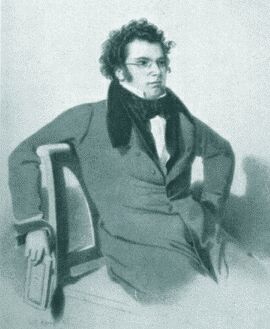 Gemälde von Wilh. Aug. Rieder, 1825 (Bildarchiv der Österr. Nationalbibliothek, Wien) |
|
Date |
Event(s) |
|
January 31, 1797 |
Franz Peter Schubert war born in Vienna. Parents: Franz Theodor Schubert (1763-1839) and Maria Elisabeth Vietz (1756-1812) |
|
1803 |
He shows a first interest in music. |
|
1805 - 1808 |
Schubert attends elementary school at his father's school. |
|
1808 |
Schubert is accepted and enters the Imperial-Royal Seminary in Vienna. |
|
1810 |
Schubert receives lessons by Antonio Salieri. First attempts at composition. |
|
1811 |
As first songs are composed: Hägars Klage, but also other compositions are written. |
|
1812 |
Even at the seminary, many songs, but also two string quartets as well as an opera fragment, Der Spiegelritter, is written this year. |
|
1813 |
Schubert leaves the seminary and takes a ten-month-course as an assistant teacher. However, he also writes a number of compositions such as songs, quartets, dances and his first symphony. |
|
1814 |
For the next three years, Schubert works as assistant teacher at his father's school and begins his writing of Goethe lieder with Gretchen am Spinnrade. He also writes his first Mass, and begins his second symphony. Another opera attempt is Des Teufels Lustschloss. |
|
1815 |
Schubert writes Der Erlkönig, his G mjaor mass no. 2, his opera attempt Der Vierjährige Posten, his first two piano sonatas, as well as further Goethe lieder, Heideröslein, An den Mond, MIgnon, and others (about 150 lieder), and also the two-act Singspiel Die Freunde von Salamanka, the G minor string quartet, and the third symphony. His first love to Therese Grob blossoms, and he meets and becomes friends with Franz von Schober. |
|
1816 |
He writes his fourth symphony, and a number of further lieder. |
|
1817 |
Schubert meets Franz Vogl and quits his teaching post. He also writes his piano sonatas no. 4 to 9. |
|
1818 |
As first Schubert work, the Italian Overture is performed in Vienna. As first of his songs, Am Erlafsee is published. Schubert spends the summer in Zseliz, Hungary, as music teacher of the daughters of Count Esterhazy. The Sixth Symphony is written. |
|
1819 |
Until 1821, Schubert lives with Mayrhofer. The Trout Quintett is written, as well as the 13th piano sonata, and the third mass is begung. Summer stay at Steyr, Upper Austria, with Vogl. |
|
1820 |
Contact with Viennese student circles. With his friend Senn, he is under police surveillance due to their suspicion of the young men's possible subversive behavior.Die Zwillingsbrüder are staged. As one of the few works of this year, Schubert writes his Quartettsatz. |
|
1821 |
Schubert lives with his friend Schober. Der Erlkönig is printed as Op. 1. Schubert writes songs to Goethe's West-Oestlicher Divan. |
|
1822 |
Schubert writes his so-called Unfinished Symphony, and further, his Wandererfantasie, the Mass in A*, as well as Alfonso und Estrella. |
|
1823 |
Schuberts illness beings. He returns to live in his parents' home. Works of the year: Fierabras, Rosamunde, the song cycle Die schöne Müllerin. |
|
1824 |
Schubert lives alone. During the summer, he returns to Zseliz for his second stay. Weorks: His Octet, the string quartet Der Tod und das Mädchen, also a great deal of chamber music, including his A minor quartet. |
|
1825 |
In this happy year, Vogl and Schubert travel through Upper Austria. Piano sonatas 15 to 17 are written. |
|
1826 |
Schubert experiences a professional disappointment: His application for the post of Hofkapellmeister is rejected. Goethe and Shakespeare lieder are written, as well as the G major quartet, op. 161. In Fall, Schubert spends a few happy weeks in Graz with Marie Pachler and her family. |
|
1827 |
Many works are published. On March 29, Schubert takes part in Beethoven's funeral as pall bearer. He becomes more widely known as composer. Towards the end of the year, his song cycle Die Winterreise as well as the four Impromptus, Op. 90., and his das E-*-Trio are written. |
|
1828 |
During the last year of his life, many great works are completed, such as his great Symphony in C Major, his sixth Mass, his C-major string quartett, his last three piano sonatas, the song cycle Schwanengesang, and Heine-lieder. On March 26, Schubert holds his first and only public concert, which is well received by the audience, but ignored by the press. He moves to his brother Ferdinand's lodgings, falls ill in October and dies on November 19. |